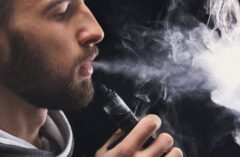Table of Contents
Last Updated on December 23, 2019 by Team Spinfuel
What The Online Vape Vend0r Needs to Know
The Online Vape Vendor must be careful
The FDA scans websites (online vape vendors) for retailers who sell tobacco. Especially roll your own. They find some items, descriptions or lack of warnings to issue warnings. The Enforcement Policy listed below has been around for some time. You may not think this has anything to do with ejuice or ENDS products but don’t be fooled. It is much easier and cost effective for the FDA to go after websites first.
If you sell e-cigarettes, ENDS or e-juice online, they will find you. If you lack warnings on the nicotine, or can’t prove your bottles are GCC compliant you eventually will get a warning letter.
If you are not using age verification on your vape vendor site (legal age verification) not just asking “Are you of legal age” question on a flash screen, you will be tagged. I am sure they will also send warning letters to anyone sell ENDS that are not in the PMTA application. I do believe this will be the scenario.
If I get any other information about online vape vendor issues I will share it with you. You can go here, to see some examples of warning letters.
Contains Non-binding Recommendations Online Vape Vendors
Enforcement Policy for Certain (Provisional)
Tobacco Products that FDA Finds Not Substantially Equivalent Guidance for Industry and Tobacco Retailers
This guidance represents the current thinking of the Food and Drug Administration (FDA or Agency) on this topic. It does not establish any rights for any person and is not binding on FDA or the public. You can use an alternative approach if it satisfies the requirements of the applicable statutes and regulations.
.FDA is issuing this guidance to provide information on its enforcement policy to retailers regarding so called “provisional” tobacco products that become subject to not substantially equivalent orders issued under section 910(a)(2)(B) of the Federal Food, Drug, and Cosmetic Act (FD&C Act).
The “provisional” tobacco products addressed by this guidance are tobacco products that were first introduced or delivered for introduction into interstate commerce for commercial distribution after February 15, 2007, and prior to March 22, 2011, and for which a 905(j) (or substantial equivalence) report was submitted no later than March 22, 2011. Under the FD&C Act, tobacco products meeting these criteria were permitted to remain on the market pending FDA’s review of such report. If FDA issues an order finding the product not substantially equivalent (NSE), the product is adulterated and misbranded (sections 902(6)(A)
and 903(a)(6) of the FD&C Act; 21 U.S.C. 387b(6)(A), 387c(a)(6)). This means that, effective immediately upon issuance of an NSE order, it is a prohibited act to sell or distribute the product in interstate commerce, to import such products into the United States, or to receive from interstate commerce and sell or offer to sell or otherwise deliver products. In addition, a tobacco product that is the subject of an NSE order is subject to seizure at any time.
Because the FD&C Act permitted this specific group of products to remain on the market pending FDA’s review of the report, there will very likely be products at retail locations within the United States when FDA issues an order finding a tobacco product NSE. FDA does not intend to take enforcement action for at least 30 calendar days from the date the NSE order issues for those products that are in the retailer’s current inventory at a specific retail location on the date FDA issues the NSE order. This policy extends only to tobacco products that are already in a retail store that offers the products for sale directly to consumers.
FDA encourages retailers to contact their supplier or manufacturer to discuss possible options for the misbranded and adulterated product that they may have in their current inventory. FDA’s guidance documents do not establish legally enforceable responsibilities. Instead, guidance describe the Agency’s current thinking on a topic and should be viewed only as recommendations, unless specific regulatory or statutory requirements are cited. The use of the word should in Agency guidance means that something is suggested or recommended, but not required.
Online Vape Vendors will need to jump through many hoops to stay in business. Such overreach by the federal government is not uncommon, especially when the government sees an industry they can squeeze.
Wendy Bivona
Wendy Bivona is also a vape retailer. Wendy is the owner of Premium eCigs, in Melbourne Florida. Follow Wendy on Facebook. Wendy is the most informed advocate on the pro-vaping side, and she will be bringing Spinfuel Readers and Vape Shop Owners vital information for Life after August 8th.








